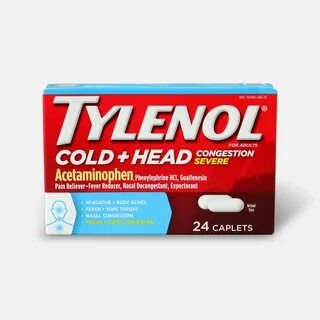Finding effective relief from cold and sinus symptoms can be challenging, especially when you want quick comfort without side effects. Many Canadians turn to Tylenol Cold and Sinus for help because it is widely available, trusted, and designed to ease congestion, headaches, and fever. However, safe use is important. This guide explores how Tylenol Cold and Sinus works, the right way to take it, possible risks, and practical tips to ensure safe relief.
Understanding Tylenol Cold and Sinus
Tylenol Cold and Sinus is an over-the-counter medication that combines acetaminophen with other active ingredients like pseudoephedrine or phenylephrine. Acetaminophen helps reduce pain and fever, while the decongestant component targets sinus pressure and nasal congestion. This combination makes it a popular choice during seasonal colds, flu, and allergy-related sinus discomfort.
Common Symptoms It Targets
Sinus congestion and pressure
Runny or stuffy nose
Headaches from colds or allergies
Mild fever
Sore throat discomfort
Body aches
Why Many Canadians Choose Tylenol Cold and Sinus
Canadians often select this medication because it is easy to find in pharmacies, grocery stores, and even online. Its multi-symptom relief formula eliminates the need to buy separate medicines for fever, pain, and congestion. For busy individuals, this makes symptom management more convenient.
Other reasons for its popularity include:
Trusted Tylenol brand reputation
Options for daytime or nighttime relief
Available in caplets, tablets, and liquid form
Non-drowsy daytime versions for work and school use
Important Safety Considerations
While Tylenol Cold and Sinus offers effective relief, it must be used responsibly. Many people assume over-the-counter medicines are harmless, but misuse can lead to serious health issues.
Follow the Recommended Dosage
Always read the label before use.
Avoid exceeding the maximum daily acetaminophen limit of 4,000 mg for adults.
Do not combine with other medications that contain acetaminophen, as this increases the risk of liver damage.
Be Cautious with Decongestants
Pseudoephedrine and phenylephrine can raise blood pressure and cause rapid heartbeat. People with hypertension, heart disease, or thyroid conditions should seek medical advice before using Tylenol Cold and Sinus.
Avoid Mixing with Alcohol
Alcohol and acetaminophen together increase the risk of liver injury. Even small amounts of alcohol can create problems if combined with repeated doses of Tylenol products.
Who Should Consult a Doctor Before Use
Certain groups must take extra care before using Tylenol Cold and Sinus in Canada:
Pregnant or breastfeeding women
Older adults with heart or kidney conditions
Children under 12 years unless specifically approved
People already on prescription medications such as blood pressure drugs, antidepressants, or anticoagulants
Daytime vs Nighttime Tylenol Cold and Sinus
Tylenol Cold and Sinus comes in two main types: Daytime and Nighttime formulas.
Daytime Formula
Contains non-drowsy ingredients
Helps control congestion, fever, and sinus pain
Suitable for school, work, or travel
Nighttime Formula
Includes antihistamines to reduce sneezing and promote rest
May cause drowsiness
Best taken before bedtime to help you sleep through discomfort
Practical Tips for Safe Relief
To get the most from Tylenol Cold and Sinus without side effects, follow these practical tips:
Stay Hydrated
Drink plenty of water to thin mucus and reduce sinus pressure. Hydration also supports the liver in processing acetaminophen safely.
Use a Humidifier
Moist air helps ease nasal passages and improves breathing. Pairing Tylenol Cold and Sinus with a humidifier often provides faster comfort.
Rest Well
Adequate rest helps the immune system fight infection. Combine medication with relaxation for faster recovery.
Monitor Other Medications
Check if your cough syrups, flu tablets, or allergy medicines already contain acetaminophen or decongestants. Doubling up increases the risk of overdose.
Limit Caffeine
Decongestants can increase nervousness and jitteriness. Avoid excess coffee or energy drinks while taking Tylenol Cold and Sinus.
Side Effects to Watch Out For
Although most people tolerate Tylenol Cold and Sinus well, some may experience side effects. Knowing what to expect helps you act quickly if something feels wrong.
Mild Side Effects
Dry mouth
Nervousness or restlessness
Trouble sleeping (with daytime versions)
Upset stomach
Serious Side Effects (Seek Medical Help Immediately)
Severe allergic reaction (rash, swelling, difficulty breathing)
Liver damage symptoms (yellowing skin, dark urine, persistent nausea)
Rapid or irregular heartbeat
Unexplained fatigue
Alternatives to Tylenol Cold and Sinus
While Tylenol Cold and Sinus is effective, some Canadians prefer other methods or medications depending on their health needs.
Over-the-Counter Alternatives
Advil Cold & Sinus (ibuprofen-based)
NeoCitran (hot drink formula for cold relief)
Benylin Cold and Flu
Natural Remedies
Steam inhalation with eucalyptus oil
Warm ginger tea with honey
Saline nasal sprays
Rest combined with vitamin C and zinc intake
Storage and Handling Guidelines
Safe handling ensures Tylenol Cold and Sinus remains effective:
Store at room temperature in a dry place.
Keep away from children and pets.
Do not use expired medication.
Dispose of unused tablets properly at a pharmacy disposal point.
Making an Informed Choice
When choosing Tylenol Cold and Sinus in Canada, think about your symptoms, health conditions, and lifestyle needs. For example, someone working long shifts may prefer the non-drowsy version, while another person may benefit more from nighttime relief for restful sleep.
Pharmacists can provide valuable guidance if you are unsure which option suits your needs. Always be honest about other medications you take to avoid dangerous interactions.
Final Thoughts on Safe Relief
Tylenol Cold and Sinus remains one of the most trusted cold and sinus relief options in Canada. Its combination of pain relievers and decongestants makes it a convenient solution for multiple symptoms. Still, safe use is essential. Following dosage instructions, avoiding mixing with alcohol, and consulting healthcare professionals when needed ensures you get relief without risks.
By pairing Tylenol Cold and Sinus with healthy habits like hydration, rest, and proper nutrition, you can recover faster and reduce the impact of seasonal colds or sinus troubles. Always stay informed and choose wisely for long-term health.


 :
: